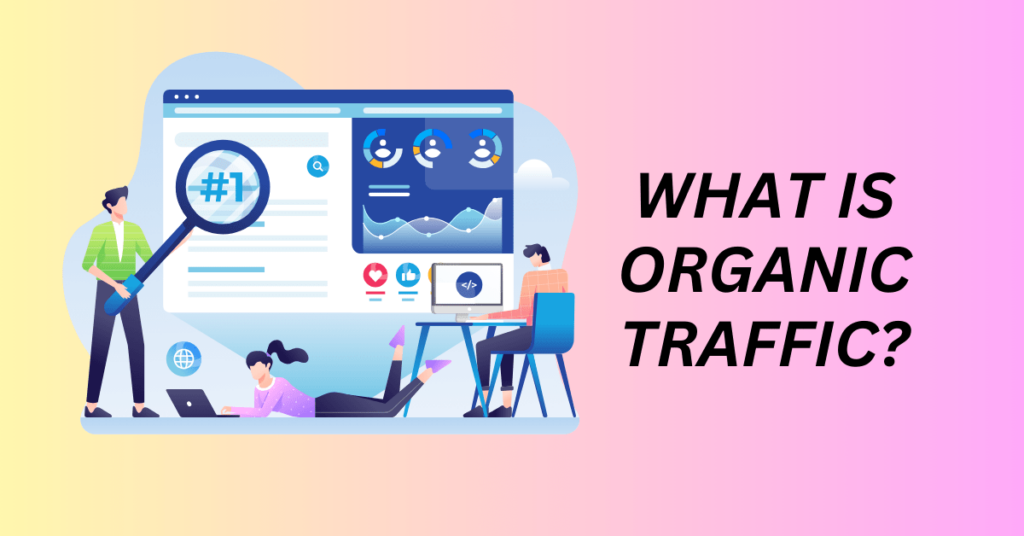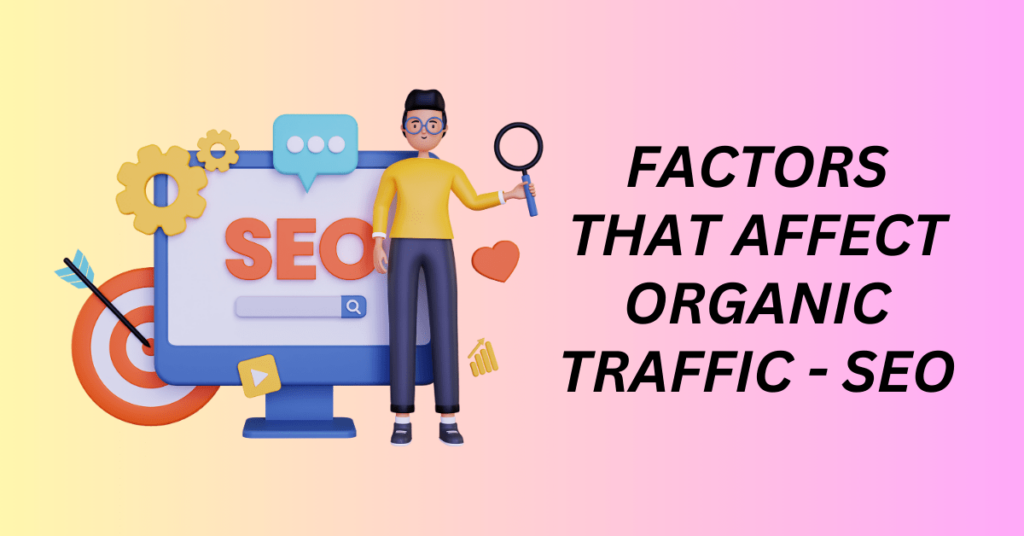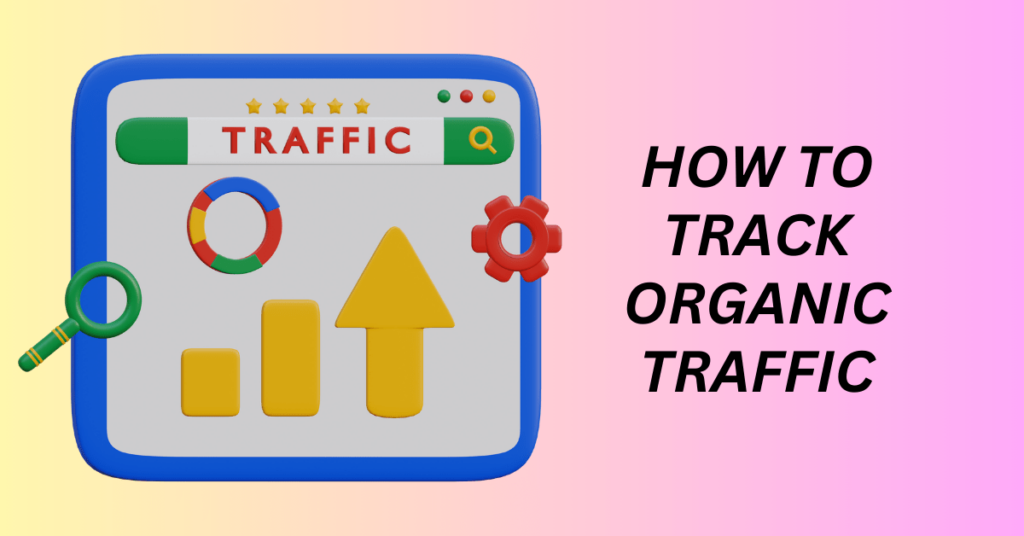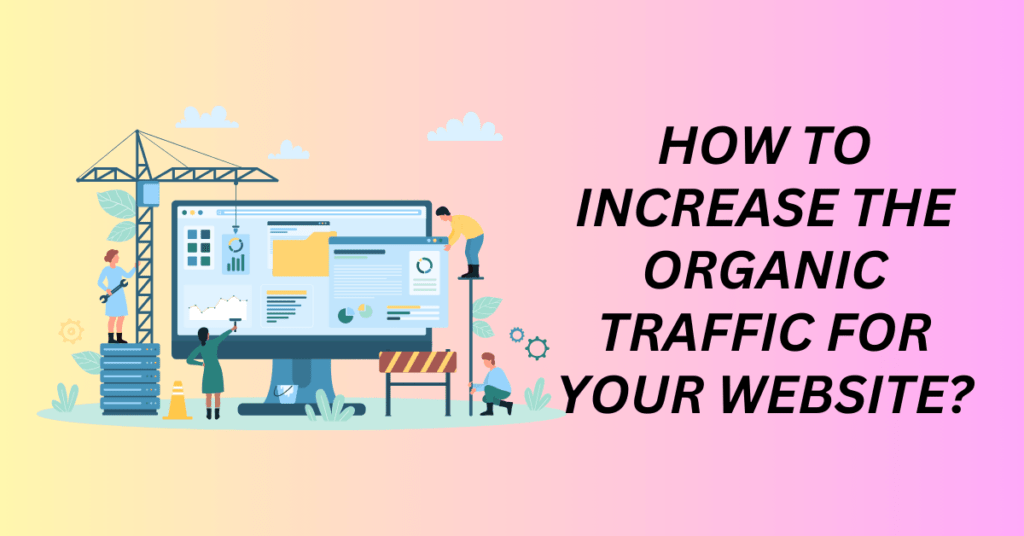When a visitor arrives at your website through an online search, you’re experiencing organic traffic. Online traffic is a valuable form of visitor engagement for your website. While paid advertising can deliver quick outcomes, sustainable long-term growth is nurtured through organic reach via search engines.
For most business owners, organic traffic is their long-term traffic strategy for organic growth. However, with the ever-changing online environment, having the right and updated strategy is very important to get it worked.
While fundamental search engine optimization (SEO) strategies can be beneficial, truly maximizing organic reach requires more than just on-page optimization and backlinks.
Today, we will be sharing everything you need to know about organic traffic and how to strategize your online business to get more organic traffic.
Start Your Website with Shopify Today!
What is Organic Traffic For Your Website?

Organic traffic is the lifeblood of online visibility and is fundamental to understanding a website’s reach and engagement. In short, organic traffic refers to the visitors who land on a website through unpaid, natural search engine results.
When a user enters a search into a search engine, the algorithms will sort through the vast amount of content available on the web and present the most relevant and high-quality results. Websites that rank well on the search engine results page (SERP) without paid advertising are then deemed to have a strong presence in generating organic traffic.
The beauty of organic traffic lies in its free and sustainable nature. Unlike paid forms of traffic, which require continuous financial investments, organic traffic is cost-effective, making it a favoured choice for businesses and website owners.
However, achieving high rankings and driving organic traffic involves strategic Search Engine Optimization (SEO) efforts, focusing on optimizing content, improving website structure, and employing other SEO tactics. When done effectively, these practices can propel a website to the top of search results, attracting a steady stream of visitors genuinely interested in the content or offerings, thereby boosting engagement and potential conversions.
Start Your Website with Shopify Today!
The Benefits of Organic Traffic For Your Website

The benefits of organic traffic are manifold and hold immense significance for online businesses.
1. Cost-Effectiveness:
One of the most prominent benefits of organic traffic is that it is free. Unlike paid advertising, where you pay for each click or impression, organic traffic doesn’t incur any direct costs.
While achieving high rankings may require investments in SEO (Search Engine Optimization), the ongoing flow of organic visitors doesn’t require a continual budget.
2. Credibility and Trust:
Websites ranking high in organic search results are generally perceived as more credible and trustworthy by users. This is because people often trust the algorithms of search engines and believe that top-ranking websites are the most reputable and relevant to their queries.
This trust can significantly impact a user’s decision-making process and increase the likelihood of conversions.
3. Sustainable Growth:
Organic traffic provides a solid foundation for sustainable growth. When you optimize your website for search engines and create high-quality, relevant content, it continues to attract visitors over time without ongoing financial investments.
As your website gains authority and ranks higher, your organic traffic will also tend to grow steadily, providing a long-term, reliable stream of visitors.
4. Better User Experience:
SEO practices aimed at improving organic rankings also enhance the overall user experience. In addition, optimized websites load faster, are mobile-friendly, and offer easy navigation, which leads to higher user satisfaction. Besides, positive user experiences often result in increased engagement, repeat visits, and better conversions.
5. Targeted Traffic:
Organic traffic is often highly targeted as it is driven by users actively searching for specific information, products, or services related to your niche. By optimizing your website for relevant keywords and phrases, you attract visitors genuinely interested in what you offer, increasing the chances of conversion and return visits.
6. Long-Term Value:
Unlike paid advertising, where the traffic stops as soon as you stop paying, the benefits of organic traffic endure. Once your website achieves high organic rankings, it can maintain those positions for an extended period, providing continuous and valuable traffic without ongoing expenses.
Factors That Affect Organic Traffic For Your Website – SEO

Search Engine Optimization (SEO) is the process of optimizing a website to improve its visibility and ranking on search engine results pages (SERPs). Therefore, a well-executed SEO strategy is vital for attracting organic traffic, enhancing user experience, and driving growth for your online presence. Let’s delve into the critical factors that influence SEO and how you can harness them to optimize your website effectively.
1. Quality and Relevance of Content:
Firstly, content is the backbone of organic traffic. Search engines prioritize high-quality, relevant, and valuable content. Therefore, the better your content matches search intent, the higher the likelihood of ranking well.
- Quality Content: Create informative, engaging, and error-free content that resonates with your target audience.
- Keyword Optimization: Integrate relevant keywords naturally within your content to align with search queries.
- Freshness and Updates: Regularly update and refresh your content to reflect current trends and information.
2. Backlinks and Link Building:
Next, backlinks are an essential SEO factor, indicating a website’s authority and credibility. Quality backlinks from reputable sources can significantly impact your rankings.
- Quality Backlinks: Seek backlinks from authoritative and relevant websites within your industry.
- Natural Link Building: Focus on creating share-worthy content that naturally attracts backlinks.
- Internal Links: Utilize internal linking to guide users and search engines to important pages on your website.
3. On-Page SEO:
In addition, on-page SEO involves optimizing various elements on your website to enhance its visibility to search engines and improve user experience.
- Title Tags and Meta Descriptions: Craft compelling and relevant title tags and meta descriptions for each page.
- Header Tags: Use header tags (H1, H2, H3, etc.) to structure your content and highlight key points.
- URL Structure: Create clean, readable URLs that include relevant keywords.
4. Website Speed and Performance:
Page speed and overall website performance are critical factors influencing SEO. Slow-loading websites can negatively impact user experience and, consequently, search rankings.
- Optimize Images and Files: Compress images and files to reduce load time without compromising quality.
- Minimize HTTP Requests: Reduce the number of elements that require loading for faster page speed.
- Utilize Caching: Implement browser caching to store frequently accessed resources locally, reducing load times for repeat visitors.
5. Mobile Optimization:
With the majority of internet users accessing websites on mobile devices, mobile optimization is crucial for SEO success.
- Responsive Design: Ensure your website is easily accessible and functions well on various mobile devices.
- Mobile-First Indexing: Design and optimize your website with mobile users as the primary audience.
6. User Experience (UX):
A positive user experience is paramount for both SEO and retaining visitors. Search engines reward websites that offer a seamless and enjoyable browsing experience.
- Intuitive Navigation: Design a clear and intuitive navigation structure for easy website exploration.
- Reduced Bounce Rate: Aim to provide content that encourages visitors to stay longer and explore multiple pages.
- Mobile-Friendly Design: Ensure that your website is mobile-friendly to enhance the overall user experience.
7. Technical SEO:
Technical SEO involves optimizing the technical aspects of your website to improve its search engine visibility.
- Site Structure: Maintain a clear and organized site structure for easy navigation and crawling by search engines.
- Schema Markup: Implement schema markup to provide additional information to search engines and enhance visibility in SERPs.
- XML Sitemap: Create an XML sitemap to help search engines index and understand the content on your site.
8. Local SEO:
For businesses targeting a local audience, local SEO is crucial for visibility in local searches.
- Google My Business: Claim and optimize your Google My Business listing with accurate business information.
- Local Keywords: Incorporate location-specific keywords in your content, meta descriptions, and titles.
9. Social Signals:
While not a direct ranking factor, social signals (engagement on social media platforms) can indirectly influence SEO by enhancing brand visibility and driving traffic.
- Social Sharing: Encourage social sharing of your content to increase its reach and potential for backlinks.
- Engagement: Actively engage with your audience on social media to build a strong online community.
10. Search Engine Algorithm Updates:
Search engines like Google frequently update their algorithms. Staying informed about these updates is crucial to adapt your SEO strategies accordingly.
- Stay Informed: Keep up with SEO news, blogs, and updates from search engine providers to understand the latest changes and trends.
- Adaptability: Be prepared to adjust your SEO strategies and tactics based on algorithm updates to maintain or improve your rankings.
In short, effective SEO involves a holistic approach, incorporating content quality, backlinks, technical optimization, user experience, and adherence to evolving search engine algorithms. By understanding and leveraging these factors, then you can optimize your website to rank higher in search results, attract more organic traffic, and ultimately drive the growth of your online presence.
Start Your Website with Shopify Today!
How to Track Organic Traffic

Tracking your organic traffic is essential for optimizing your website’s performance and maximizing its reach.
By monitoring and analyzing organic traffic, you then gain insights into the effectiveness of your SEO strategies and can make informed decisions to enhance your website’s visibility. Here’s a comprehensive guide on how to effectively track and measure organic traffic.
1. Utilize Web Analytics Tools:- Organic Traffic For Your Website
Web analytics tools are instrumental in tracking and analyzing website traffic. Platforms like Google Analytics provide valuable data on various metrics. This will also include the number of organic visitors, their behaviour, and the pages they interact with.
You can then create a Google Analytics account and integrate the tracking code into your website to start collecting data on organic traffic.
2. Monitor Organic Search Metrics:- Organic Traffic For Your Website
To specifically track organic traffic, focus on key metrics related to organic searches within your analytics tool.
- Organic Sessions: Monitor the total number of sessions generated from organic search results.
- Organic Users: Track the number of unique users coming from organic searches.
- Organic Pageviews: Keep an eye on the total number of pages viewed through organic traffic.
3. Analyze Keywords and Search Queries:- Organic Traffic For Your Website
Then, understanding the keywords and search queries that bring visitors to your site is crucial for refining your SEO strategy.
- Keyword Analysis: Identify the top-performing keywords that drive organic traffic and optimize your content around them.
- Search Queries: Analyze the actual search queries that lead users to your site to refine your content further.
4. Examine Landing Pages and Behavior Flow:- Organic Traffic For Your Website
Then, study the landing pages that receive the most organic traffic and how visitors navigate through your website.
- Landing Page Performance: Evaluate the performance of specific landing pages to determine which pages attract the most organic traffic.
- Behaviour Flow: Analyze the paths visitors take through your website to identify popular entry and exit points.
5. Track Conversions and Goals:- Organic Traffic For Your Website
Then, measuring conversions is crucial to determine the effectiveness of your website in converting organic visitors into desired actions.
- Set Conversion Goals: Define specific goals such as form submissions, newsletter sign-ups, or product purchases.
- Track Goal Completions: Monitor and analyze the completion of these goals attributed to organic traffic.
6. Understand Referral Sources and Backlinks:- Organic Traffic For Your Website
Then, track the sources of referral traffic and the websites linking to your content. This information can help you gauge the impact of backlinks on your organic traffic.
- Referral Sources: Identify the websites that refer visitors to your site through organic links.
- Backlink Quality: Assess the quality and relevance of the backlinks directing traffic to your website.
7. Monitor Mobile vs. Desktop Traffic:- Organic Traffic For Your Website
Then, distinguish between mobile and desktop organic traffic to optimize your website for various devices.
- Mobile Traffic Analysis: Evaluate the proportion of organic traffic coming from mobile devices and assess the mobile user experience.
- Desktop Traffic Analysis: Likewise, analyze desktop traffic to ensure a seamless experience for desktop users.
8. Regularly Review and Adjust Strategies:- Organic Traffic For Your Website
Finally, continuous monitoring is vital for optimizing your website’s organic traffic over time.
- Regular Analysis: Conduct periodic reviews of your analytics data to identify trends, anomalies, and opportunities for improvement.
- Adjust SEO Strategies: Based on the analysis, adjust your SEO strategies, content creation, and optimization efforts to enhance organic traffic.
Tracking organic traffic involves a multifaceted approach that includes leveraging web analytics tools, analyzing metrics, understanding user behaviour, and adapting your strategies accordingly. By diligently monitoring and interpreting data, you can optimize your website to attract more organic traffic and ultimately achieve your online goals.
Start Your Website with Shopify Today!
Strategies To Increase Website Organic Traffic
Driving organic traffic to your website is a cornerstone of a successful online presence. It not only brings visitors to your site but also establishes credibility and potential conversions. Implementing effective strategies to boost organic traffic is a multi-dimensional approach involving Search Engine Optimization (SEO), content creation, user engagement, and staying informed about industry trends.
1. Optimize Your Website for Search Engines (SEO):
To enhance organic traffic, optimizing your website for search engines is paramount. This begins with thorough keyword research to identify the most relevant and high-traffic keywords within your niche. Once identified, these keywords should be seamlessly integrated into titles, meta descriptions, headings, and throughout the content.
Additionally, ensuring your website is mobile-optimized and focuses on improving site speed and overall performance contributes significantly to better search rankings, ultimately leading to increased organic traffic.
2. Create High-Quality, Engaging Content:
Content is at the heart of attracting organic traffic. Creating high-quality, engaging content that resonates with your target audience is vital. Regularly publishing blog posts, articles, and other valuable content not only establishes your expertise but also helps in keyword optimization.
Utilizing various formats such as infographics, videos, and interactive tools enhances user engagement and can set you apart in the digital landscape. Evergreen content, which remains relevant and valuable over time, ensures a consistent flow of organic traffic to your website.
3. Optimize for Local Search:
For businesses targeting a local audience, optimizing for local search is vital. Utilize Google My Business to provide accurate business information and improve your local visibility. Incorporate location-specific keywords in your content, meta descriptions, and titles to attract local organic traffic.
Listing your business in local directories and ensuring consistent NAP (Name, Address, Phone number) information across online platforms establishes credibility within your local community.
4. Leverage Social Media and Email Marketing:
Utilizing social media platforms to share your content and engage with your audience is a powerful strategy for boosting organic traffic. Regularly sharing blog posts, articles, and updates on social media not only increases visibility but also encourages user interaction and sharing.
Similarly, leveraging email marketing by sending newsletters and updates to your subscribers, and directing them to relevant content on your website, can significantly drive traffic and enhance user engagement.
5. Optimize for Featured Snippets and Voice Search:
Optimizing your content to appear as featured snippets is a strategic move to increase visibility. By directly answering common questions in your content, you increase the likelihood of being featured in snippet results, driving more organic traffic.
Additionally, tailoring your content to align with voice search by using natural language and conversational keywords ensures your website remains competitive in the era of voice-activated searches.
6. Build Quality Backlinks:
Backlinks from reputable sources significantly impact your website’s authority and, consequently, its search engine rankings. For this, you will then need to engage in guest posting, broken link building, and sharing original data or infographics to generate high-quality backlinks.
These backlinks will then enhance your website’s credibility, increase its online visibility, and ultimately drive more organic traffic.
7. Monitor and Analyze Performance:
To effectively increase organic traffic, you will also need to have regular monitoring and analysis of your website’s performance. Besides, you should utilize web analytics tools to track your website’s organic traffic, user behaviour, and conversions. Finally, conduct A/B testing to experiment with different strategies and optimise based on the results.
By understanding the data and user insights, you can make informed decisions to refine your approach and attract more organic traffic.
8. Engage with Your Audience:
Next, you should also engage with your audience actively. This is key to building a loyal online community and increasing organic traffic. In addition, respond to comments on your blog posts and social media to foster a sense of interaction.
Not only that, conducting Q&A sessions or webinars allows you to directly address your audience’s concerns, provide valuable insights, and build a stronger connection with them.
9. Stay Informed and Adapt:
The digital landscape is constantly evolving, and staying informed about SEO trends, algorithm changes, and emerging technologies is crucial. Continuous education and adaptability are key to remaining competitive and relevant in the online sphere.
By keeping up with the latest industry developments, you can adjust your strategies to align with the evolving digital landscape and maximize organic traffic.
10. Collaborate and Network:
Collaborations and partnerships within your industry can significantly expand your reach and increase organic traffic. Collaborate with influencers or other businesses for joint projects, guest posting, or cross-promotion. Also, it is important to attend industry events and webinars, and networking with fellow professionals allows you to stay informed about industry developments, trends, and best practices, ultimately enhancing your strategies to attract more organic traffic.
Final Thoughts – How To Increase The Organic Traffic For Your Website?
Organic traffic is important for your website’s long-term growth. When you build your reputation and get your website ranked top for the right keywords, you will be getting lots of traffic for free.
However, it does take time and effort to get your website ranked on the search engine. The algorithm might take time to eventually rank your website. Not only that, you need to constantly look at the ranking and see if anyone tried to outrank you.
If yes, you will need to have another strategy to see how you can fight back for your place.


